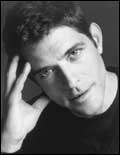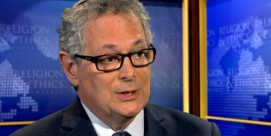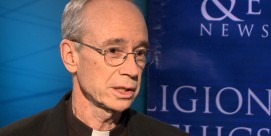In This Episode << SLIDE LEFT TO SEE ADDITIONAL SEGMENTS
Brad Gooch Interview
ON THE ROAD IN SPIRITUAL AMERICA
Read an interview with Brad Gooch, author of the new book GODTALK: TRAVELS IN SPIRITUAL AMERICA (Alfred A. Knopf). It was conducted via e-mail this week while he was on a speaking tour in California and Washington:
What is religion, what is spirituality, and what is the difference between them?
A professor of philosophy who specializes in Tibetan Buddhism recently told me that her professor at Barnard in the sixties used to say that religious experience is a sphere. On its outer rim of ritual, dogma, doctrine, and language, religions are the most different. As you proceed in to a core of “mystical” practices of prayer and meditation they become more similar. I feel that “religion” is a term emphasizing the colorful outer rim, and “spirituality” the term people are using for the inner core of interactive practices.

“Spirituality” is a useful label in an increasingly non-denominational age. The other evening at a reading at East-West Bookstore in Mountain View, outside of San Francisco, a man in the second row reported that in Santa Cruz more and more churches were being formed. These churches, he said, were Christian but were entirely non-denominational and connected to no establishment larger than their own community. I’d just come from Dallas where large “cathedrals,” advertised on billboards along the highway, were also congregation-specific and weren’t aligned with any larger Christian denomination. I’d signed books at the Cathedral of Hope, a gay cathedral affiliated with the Metropolitan Community Church, a denomination, but a gay denomination, which confounds the old notion of denomination in its very premise of an identity spirituality.
The poet Frank O’Hara wrote that, “politics is face to face.” I find spirituality to be face to face these days, too. People are drawn to siddha yoga because their friends are. Others are drawn to leaders with whom they feel comfortable — Deepak Chopra, Mel White. In small towns and cities, members often pick a church because of proximity. Few teenagers could elucidate the difference between a Presbyterian and a Congregationalist, for instance. This shift from dogma, doctrine, and denomination to experience and practice is a shift in emphasis from what we’ve called “religion” toward what we’re calling “spirituality.”
Like the term “gay,” “spirituality” can be an annoying, cloying term or label for the very seekers most engaged. But, like the term “gay” again, it’s gained the widest usage and everyone basically understands its meaning and its distinction from “religion.”
GODTALK includes a foray into the world of Christian monasticism. Is the “new” spirituality in America as much about the retrieval of ancient, perhaps neglected contemplative spiritual practices as it is about searching for spirituality in the strange, the new, the unfamiliar, and exotic? Is it still possible for the great sermon, the moving hymn, the recited creed, the standard liturgy to be a deeply spiritual experience in America? And is there a story behind the dedication of your book to the memory of Canon Edward West?
When I was in my early twenties in the early 1970s, a recent Columbia College grad living in Paris, I was seized with a burning desire to be a monk, a Trappist monk. I was very into all things medieval, especially St. Thomas Aquinas. When I returned to the U.S., I did visit the Trappist Abbey of Gethsemani, Kentucky, which I returned to in writing GODTALK. I eventually joined a semi-monastic community of men and women, The Trees, affiliated with the Cathedral of St. John the Divine in New York City. Most significant in that period, though, was my meeting Canon Edward West, a canon at the Cathedral, who satisfied my mystical longings by teaching me the Jesus Prayer and becoming my confessor, but who also talked me down from an accident waiting to happen — I wasn’t really cut out for the monastic life. It was more of a late adolescent fantasy. He actually moved me gradually toward traditional church-going, and to an integration of my celestial impulses with the daily round. My favorite of his comments to me: “A Christian is someone who’s met one.” Hence, the dedication of my book to him.
I do think that while the number of monks may be dwindling, the guesthouses of monasteries are full. You need to book a year in advance to go on retreat in many contemplative monasteries in America. I think just in the time I’ve taken writing the book, many American frequent-flyer pilgrims have transformed from tourists to travelers. They’re more attuned to the traditional contexts of their religious experiences. American Tibetan Buddhists are now often learning Sanskrit. American Sufis are more often learning Arabic or going on hajj to Mecca. Christian monasteries are a rich repository of ancient, traditional prayers, hymns, practices, and attitudes that those filling the guesthouses are finding to have a refreshed resonance. Many seekers do indeed wind up back where they started after a period of checking out other options, becoming educated spiritual consumers, and then finding a renewed value in hymns, liturgy, and the Bible itself, both Torah and Prophets for Jews, and the Gospels for Christians.
Who are some of the other people, what are some of the practices, traditions and places that didn’t get into this book on the American spiritual scene but just as well might have?
Choosing was one of the greater challenges in writing GODTALK. At first I was entranced by some spectacular movements such as Promise Keepers, which has become yesterday’s news. I wanted to write about the Kaballah, which is Jewish mysticism, and Tibetan Buddhism, but they seemed simply overexposed in the mid-90s. The decision there was purely journalistic, and I could easily have included them.
The structure of GODTALK is more a collection of short stories than a sweeping novel. It’s modular. I could certainly see it unfolding out even more. Right now, I would write about the African religions, and Santeria, being practiced in America mostly by African-Americans and Latinos, but by others as well. The pantheon of African deities such as Shango fascinates me. Based on what the gentleman reported at my reading the other evening, I might well write about the proliferating non-denominational churches in Santa Cruz. I think I would now also circle back as well to write about a Protestant church, a Catholic parish, and a Jewish synagogue in small-town or suburban America. I’d be interested to see how the issues I’ve been sampling are registering in these former paradigms.
Someone at a reading I gave in Miami said that he was an atheist, and that when he realized his atheism in middle age he experienced the same sort of joy, relief, transcendence, and coherence that he read about in an account of spiritual conversion. I think that atheism is a responsible attempt to deal with the big questions raised by religions and qualifies as a spiritual “movement,” and an underreported one.
One of the Muslims you interviewed says, “As Islam in America evolves, it’s going to have an effect on how the religion is practiced in other parts of the world.” That seems so sanguine. Based on all your interviews and travels and reporting, do you agree? Does a battle among interpretations of Islam still loom? And beyond Islam, are you optimistic about the whole interfaith enterprise in the U.S. that has seemed to pick up steam in the wake of 9-11? (Recent national polling by RELIGION &: ETHICS NEWSWEEKLY and U.S. NEWS & WORLD REPORT revealed than religious tolerance in the U.S. is based less on familiarity and knowledge of one another religiously and much more on indifference and deep unfamiliarity with world religions in America; at the same time, strong majorities of Americans say they believe there is truth in all religions.)
I actually handed in my manuscript for GODTALK on about September 10, so much of the Islam chapter was reported before 9/11. I did go back and check in with the principals and updated parts. But I’m actually glad for the timing. I think it would be more difficult today to “infiltrate” as easily into Muslim communities, as paranoia is high. Likewise, I might have found it more difficult to see Islam through much else than the single frame of terrorism and fundamentalism. I was able to be more open and clear-eyed. Some of those interviewed, however, might also transpose their statements a bit. Sanguinity and optimism about interfaith efforts between Muslims, Jews, and Christians might sound too stretched at the moment.
That said, darkness sometimes creates light in social history. I know that when AIDS was so associated with gays during the 1980s it seemed the worst possible development for a group that had been fighting for over a decade for tolerance and an impartial hearing. Nevertheless the moving of the topic to talk shows and headlines, with bold-faced names, actually led to a greater knowledge about gay life and eventually to WILL & GRACE. Certainly Americans are far more knowledgeable about Islam than they were before 9/11. Perhaps this great familiarity will lead to a more natural interfaith attitude. Who knows?
Maybe I’ve been spending too much of my book tour on the West Coast, but certainly the message I’ve been hearing has been of greater sophistication about religious relativity. William James’s notion of the “varieties of religious experience,” or [Aldous] Huxley’s of a “perennial philosophy” seem to have made the transition from elitist philosophy to what I’m thinking of — not disparagingly — as pop spirituality, or popular spirituality. I suppose I’ve naturally been spending time with those “strong majorities” you mention.
Any parting thoughts on the interpretive side of the stories you tell in the book rather than the narrative and descriptive side of this “free trade agreement” of religious rituals and spiritual practices that you say has taken hold in the U.S.? Just what does it all signal? How do you explain the appeal of these many and various beliefs, and what do you think such a spiritual free trade agreement will mean for American society down the road?
I can only see the interfacing of traditions continuing. I hear more people describe themselves as Buddhapalians, or Quaker and Episcopalian, or various hybrids. More and more Roman Catholics are “cafeteria Catholics,” despite the papal warning. Some of this mixing and matching is just easy dabbling. But often people are being quite responsible in their search. As my “media escort” said to me driving back from a reading at a bookstore outside of Seattle, “It’s easier just to have one religion to identify with and belong to. Lots of people want that. As soon as you start looking around, you’re taking responsibility for your own spirituality. And that can be unsettling.” She was expressing the anxiety of such spirituality.
America seems to be a main locale where global spirituality is being explored. In America the connections between spirituality and sexuality, gender, money and power are being exposed and talked about in new ways. Do you need to be poor to be truly spiritual? Can you be gay and be religious? Why are men designated leaders in some religions? I feel we’re at the tipping point of a Reformation not simply of the Roman Catholic Church, as was undertaken by Martin Luther, but of all religions and spiritual traditions simultaneously. Whether we actually tip remains to be seen.







